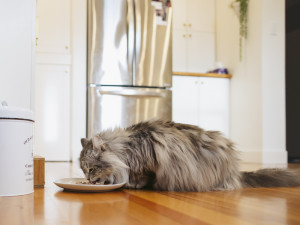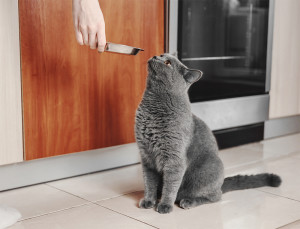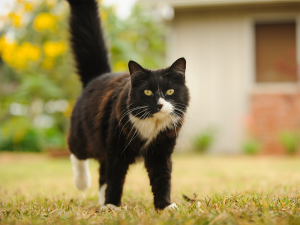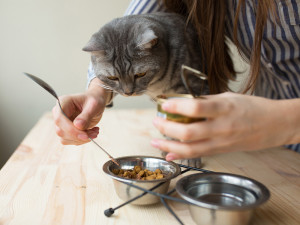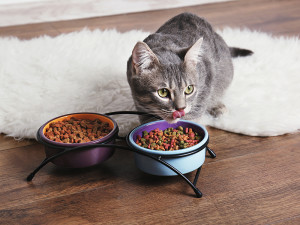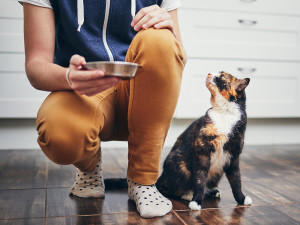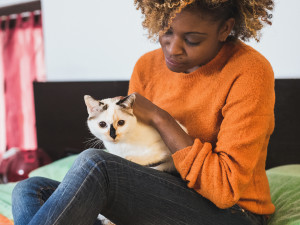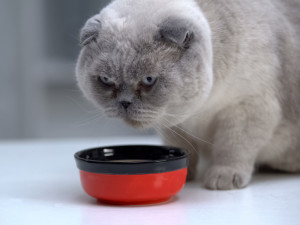Does Grain-Free Pet Food Put Your Cat at Risk for Heart Disease?
And learn what factors are at play when it comes to your kitty’s cardiac health.
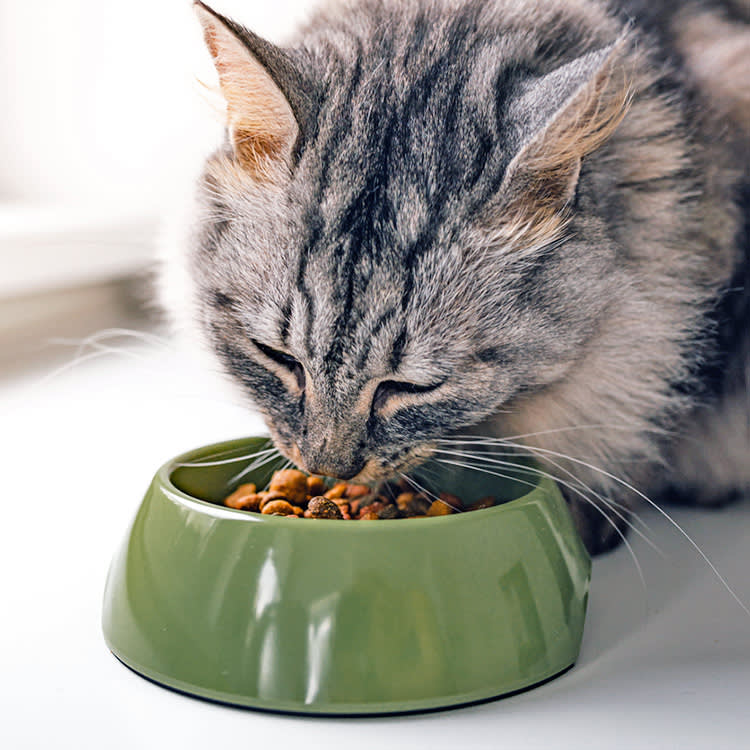
Share Article
Your cat’s heart is a complicated little thing. At rest, an adult cat’s heart beatsopens in a new tab around 140 to 200 times per minute. In newborn kittensopens in a new tab, it’s an incredible 200 to 300 times. For comparison, a healthy human heart will beatopens in a new tab about 60 to 100 times per minute, while a dog’s average heartbeat rateopens in a new tab is more like 70 to 120.
There’s no need to worry, though — their body knows what it’s doing, and all those beats are just what it takes to keep a healthy cat up and running. Unfortunately, though, heart disease is pretty common in cats, and you can’t always tell whether they’re suffering from it or not.
For years now, there has been some speculation around grain-free food and whether it can cause heart diseaseopens in a new tab, or cardiomyopathy in pets, specifically in dogs. So, what about cats?
The grain-free cat food debate
The biggest issue here is not necessarily that the cat food is grain-free but rather that they get the protein (and the nurtients that come from it). Cats are obligate carnivores, which means that they absolutely need meat in their diet but don’t need much in the way of carbohydrates, fruits, veggies and other ingredients that dogs enjoy.
In fact, cats cannot process some ingredients, and it is integral that they eat lots of good quality meat. There are also essential chemicals that cats cannot synthesize, like taurine, which is an amino acid needed for heart health. That means that they need to consume it through their food so that they don’t have deficienciesopens in a new tab. Because taurine is naturally present in animal ingredients, food — including that which is grain-free — that is rich in animal protein can help with a cat’s overall health, including their heart.
As integrative veterinarian Dr. Lindsey Wendt has told usopens in a new tab, the concerning ingredients in some grain-free foods are pulses (beans, peas, lentils, chickpeas). Just like grain, those legumes don’t have the required taurine that cats need, so if you choose a grain-free food, just make sure protein is one of the primary listed ingredients.
What to know about heart disease in cats
Cardiomyopathy is the term for any disease that affects the heart itself. It’s the most common form of heart disease in cats and the most common cause of heart failure, and while some cats can be born with it, it can strike at any time. While different sources are conflicted on the actual occurrence of disease (many vets’ websites cite one in 10 catsopens in a new tab afflicted with it, per the American Vet Medical Association oopens in a new tabr AVMA), it’s clear that it’s a serious issue affecting many cat parents.
So, has there been an increase in the number of cats with heart disease? Not necessarily, says Dr. Nathalie Dowgray, the head of International Cat Careopens in a new tab’s veterinary division. “We understand a lot more about the types of heart disease in cats and how common some of them are in the general population as well as specific breeds,” she says. “We also have better tools to diagnose heart disease, so this may give the impression it is rising, but there currently isn't any evidence to show that.”
Risks for cat’s heart health
As Dr. Dowgray points out, there are some factors that put cats at higher risk of heart disease. Because forms of cardiomyopathy can be inherited via genetic mutation, certain beloved breeds may carry a higher likelihood of hypertrophic cardiomyopathyopens in a new tab. For example, Maine Coons, Ragdolls, Persian, Sphynx, and both American and British Shorthairs are at high riskopens in a new tab. If you want to know your cat’s breed’s likelihood for this condition, you can do so through a genetics or DNA test.
Other risk factors include hyperthyroidism, high blood pressure, heart defects, and certain infections. If your cat has one of these conditions, it is not a given that they will get heart disease. Even if they do, they can still live a long and happy life; there is no need to worry too much, but you should see your vet to make a treatment plan.
Not all heart disease is inherited. Dr. Dowgray says that “common causes of heart disease in cats are multifactorial, and genetics play a role.” In fact, some dietary factors have even been shown to have a causal link to cardiac disease. “Diet may prove protective. We recommend feeding a good-quality cat food as the major part of the diet. One of the most important things to look out for when choosing a food is that it is a ‘complete’ food. This means that it has been developed to meet all of the cat’s nutritional needs,” Dr. Dowgray says.
Dilated cardiomyopathyopens in a new tab is a type of heart disease that has greatly reduced in recent years, as have added more taurine to their cats’ diets and now have a better understanding of their needs.
While cats’ diets are limited, there are things that you can include to help improve their heart health. Your vet might be able to offer a prescription diet to help if they have or are at risk of heart disease. Many experts recommend a low-sodium dietopens in a new tab rich in fatty Omega-3 opens in a new tabthat hits all of their caloric and taurine needs. Dr. Dowgray adds that “if a caregiver is concerned about their cat being at risk of cardiac disease, they should speak with their vet for bespoke advice as to measures to reduce the risk of heart failure will be very dependent on the individual cat and the type of heart disease they are concerned about.”
Heart disease in cats is picked up sooner than ever, but that doesn’t mean that they’re at higher risk. Luckily, it seems that we just have better tools to recognize when they have issues. Heart disease doesn’t mean that your cat will die sooner, but because it’s hard to tell whether they have it unless it’s progressed, the quicker you can know about it, the better. While you can’t reduce the chances of your cat having heart disease if it’s congenital, you can do things to reinforce their heart health throughout their life.
References:

Marianne Eloise
Marianne Eloise is a writer for outlets like The Cut, the Guardian and the New York Times. She is also the author of an essay collection Obsessive, Intrusive, Magical Thinkingopens in a new tab. She has been going on adventures with her dog Bowie since she was 17.
Related articles
![Woman feeds gray cat dry food.]() opens in a new tab
opens in a new tabDoes Your Cat Need a High-Protein Diet Like Some Bro at the Gym?
While they might not be working on their “gains,” there are other reasons this diet could be a good fit.
![Grey cat at looking up from eating on floor at home]() opens in a new tab
opens in a new tabGut Feelings: How to Balance Your Pet’s Microbiome
The mind-gut connection isn’t just for people. Your dog or cat’s gut microbiome plays a big role in their health and well-being.
![Domestic life with pet. Man holding bowl with feeding for his hungry cat.]() opens in a new tab
opens in a new tabWhat You Need to Know About High-Fiber Cat Food
Beyond your knowledge from old Fiber One commercials, here’s the full report on why your kitty might need fiber in their diet, too.
![Woman petting her cat]() opens in a new tab
opens in a new tabDon’t Come For Us, But Is Your Cat Overweight?
We love a chonky cat, but here’s what you should know.
![Cat eating out of a red bowl]() opens in a new tab
opens in a new tabDoes Your Diabetic Cat Need a Special Diet?
Get ready for a sigh of relief — this food doesn’t have to be pricey.
![Hand holding food bowl peeks into frame as a cat looks up expectantly]() opens in a new tab
opens in a new tabThe Ultimate Puzzle: Picking the Right Cat Food
Four veterinary nutritionists pick apart the claims so that you can choose the right food for your kitty.
